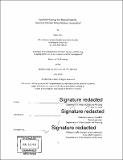| dc.contributor.advisor | Lawrence Susskind. | en_US |
| dc.contributor.author | Hasz, Adam | en_US |
| dc.contributor.other | Massachusetts Institute of Technology. Department of Urban Studies and Planning. | en_US |
| dc.coverage.spatial | n-us-ma | en_US |
| dc.date.accessioned | 2018-09-28T20:58:53Z | |
| dc.date.available | 2018-09-28T20:58:53Z | |
| dc.date.copyright | 2018 | en_US |
| dc.date.issued | 2018 | en_US |
| dc.identifier.uri | http://hdl.handle.net/1721.1/118254 | |
| dc.description | Thesis: M.C.P., Massachusetts Institute of Technology, Department of Urban Studies and Planning, 2018. | en_US |
| dc.description | Cataloged from PDF version of thesis. | en_US |
| dc.description | Includes bibliographical references. | en_US |
| dc.description.abstract | Massachusetts is widely recognized as a climate leader and a state that prioritizes social equity. However, existing Massachusetts climate policy does not effectively reduce greenhouse gas emissions and has limited support for marginalized communities. The state's annual $730 million of investment in energy efficiency is governed by the Green Communities Act, which emphasizes cost-savings for consumers rather than environmental benefits or social equity. The state's Global Warming Solutions Act does impose a legal obligation to reduce greenhouse gas emissions to 25% by 2020 and 80% by 2050 based on 1990 levels. Yet these emission reductions will not be achieved without new policies that effectively regulate carbon emissions. Finally, the state's existing environmental justice policy of Executive Order 552 is not enforced and does not govern the distribution of the $730 million of annual investment in energy efficiency. This thesis explores these challenges and suggests a new climate policy framework of "equitable electrification." To achieve this framework, Massachusetts should impose new regulations on the use of petroleum products in building heating systems. The state should also reform the Mass Save energy efficiency investment criteria to prioritize electric heat pumps. To increase support for environmental justice households, municipalities should consider administering their energy efficiency investments directly instead of using existing utility programs. Finally, policymakers should consider new legislation that imposes a progressive carbon price and prioritizes investments for marginalized communities. By pursuing these recommendations, Massachusetts can develop more effective climate policy that reduces greenhouse gas emissions while increasing social equity. | en_US |
| dc.description.statementofresponsibility | by Adam Hasz. | en_US |
| dc.format.extent | 87 pages | en_US |
| dc.language.iso | eng | en_US |
| dc.publisher | Massachusetts Institute of Technology | en_US |
| dc.rights | MIT theses are protected by copyright. They may be viewed, downloaded, or printed from this source but further reproduction or distribution in any format is prohibited without written permission. | en_US |
| dc.rights.uri | http://dspace.mit.edu/handle/1721.1/7582 | en_US |
| dc.subject | Urban Studies and Planning. | en_US |
| dc.title | Equitable energy for Massachusetts : how can climate policy reduce inequality? | en_US |
| dc.type | Thesis | en_US |
| dc.description.degree | M.C.P. | en_US |
| dc.contributor.department | Massachusetts Institute of Technology. Department of Urban Studies and Planning | |
| dc.identifier.oclc | 1054129110 | en_US |
